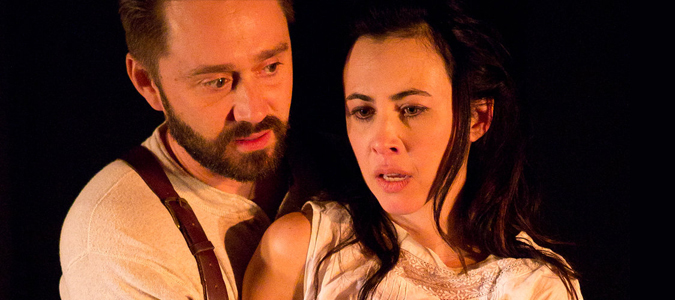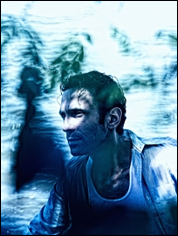

On the Other Side of the River
Opening Night: November 29, 2014
Closing: December 21, 2014
Theater: HERE Arts Center
Mir’l is a provincial girl raised in a small river town by her devout grandparents. She is on the cusp of womanhood, ready to declare her independence, when she finds herself on her own. She doesn’t know which way to turn — until she meets a luminous, mysterious stranger who lives on the other side of the river.
BUY TICKETSREAD THE REVIEWS:
December 6, 2014
From the very beginning of the New World’s Theatre Project’s production of Peretz Hirschbein’s 1906 drama On the Other Side of the River, the mood is cool and ominous. Patrick Rizzotti’s set, somewhat resembling an ice cave, echos with eerie winds that sound more like cries than forces of nature. In fact, a major force of nature is what drives this play. Mir’l (Jane Cortney), a young village girl on the cusp of womanhood, has lost both her parents. She lives with her blind grandfather Menashe (David Greenspan) in a cottage along a river. He and her grandmother Yakhne (Christine Siracusa) are the only family she has left. While Yakhne is running errands in the local village, a great storm arrives and causes the river to rise, consuming Mir’l and Menashe and their house. Menashe freezes to death, and Mir’l is met by a Stranger (David Arkema) who promises to keep her warm and bring her life. Mir’l must decide to either stay with her grandfather or return to life with the Stranger. Playwright Peretz Hirschbein was much more intent on building mood and atmosphere than he was in developing plot or character. Director Shannon Sindelar definitely honors this — she has created a wonderfully gloomy atmosphere that is capable of both consuming the characters and giving them life. She is well-assisted by Patrick Rizzotti’s aforementioned set, Nick Solymon’s evocative lighting design, and Erik T. Lawson’s brooding soundscape.
READ THE REVIEWDecember 5, 2014
New Worlds Theatre Project is devoted to reclaiming works from the Yiddish theatre and presenting them in English. It’s a fascinating, laudable mission and if its stated goal — “to see these plays produced on mainstream stages across the globe alongside translations of Chekhov, Ibsen, and others for generations to come” — seems a tad ambitious, well, why not? For all we know, there may be dozens of lost gems waiting to be brought to light. However, this interesting company, which has been around since 2005, is not putting its best foot forward with its current production. On the Other Side of the River is by Peretz Hirshbein, who was known as the “Yiddish Maeterlinck.” This means you can expect plenty of mood and abundant symbols as opposed to psychological realism or a well-constructed plot. Fair enough, but if this murky exercise in life-and-death abstractions is typical of Hirshbein’s work, it may just as well be left on the shelf. On the Other Side of the River begins with the elderly Menashe and his granddaughter, Mir’l, whose rustic home is threatened by rising waters from the nearby river. Mir’l’s mother died giving birth, and the girl is protected by a magic amulet. The flood carries them away and Menashe dies, but Mir’l is saved by a mysterious stranger who apparently drags her back to life by pulling her away from Menashe’s corpse and warming her with his embrace. Later, we see Mir’l with her grandmother, Yakhne. The young woman is so desperate to break away and find the stranger again that she tosses the amulet and throws herself into the river.
READ THE REVIEWDecember 7, 2014
A bleak and cheerless mood seeps into nearly every moment of On the Other Side of the River, a play that’s admirable for the dark chances it takes, even when it’s less than engaging to watch. River tells the story of Mir’l (Jane Cortney), a young woman whose mother died giving birth to her. Her father drowned at about the same time, and Mir’l has since lived with her grandmother (Christine Siracusa) and blind grandfather (David Greenspan). The river waters that took her father’s life are rising again, threatening to bring more sorrow to the family. Amid the flood, Mir’l encounters a stranger (David Arkema) who both frightens and bewitches her. The waters recede, but her morbid obsession with the man intensifies. The play, written by Peretz Hirshbein around 1906 and staged at Here, has the feel of a fairy tale mixed with a nightmare. There’s constant talk of fate, of dreams, of souls, much of it dispensed with no emotion. The dialogue evokes Greek tragedy as well as expressionist and symbolist drama, and comes off as stiff and portentous to ears accustomed to naturalism.
READ THE REVIEW



















